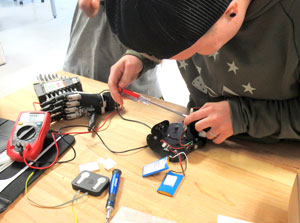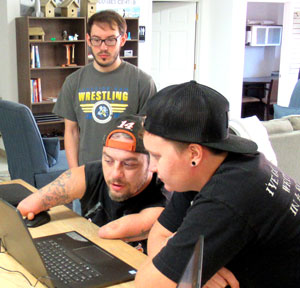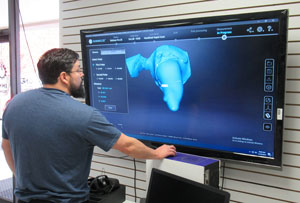

 Inspired by his own struggles with expensive and poor fitting prosthetics, National
Park College (NPC) Engineering student, Ben Scarbrough hopes to use his degree to
design affordable, custom prosthetics and disability aids. He was born with campomelic
dysplasia, a rare disorder that affects the skeletal system. He uses prosthetic legs
for mobility but says quality prosthetics are too costly for most people.
Inspired by his own struggles with expensive and poor fitting prosthetics, National
Park College (NPC) Engineering student, Ben Scarbrough hopes to use his degree to
design affordable, custom prosthetics and disability aids. He was born with campomelic
dysplasia, a rare disorder that affects the skeletal system. He uses prosthetic legs
for mobility but says quality prosthetics are too costly for most people.
“They are so expensive, and I don’t think they should be that expensive. Because
of my experience with prosthetics, I believe I can probably make them cheaper and
be able to pass that on to people so they can have the newer technology,” Scarbrough
said. He explained that prosthetics with sensors and ankle movement can cost more
than $100,000. “I believe I could build that at a cheaper rate so people who aren’t
exactly wealthy could still be able to enjoy that.”
Scarbrough completed the Industrial Technology program as part of his degree path.
The certificate requires completion of a welding course. “Because my natural arms
are shorter than average, I would need to have prosthetics to be able to complete
the class. My insurance only offers one set of prosthetics every three years, and
I am in need of legs as well, as mine are breaking down,” he said.
 Scarbrough is currently working with a team of peers to design custom prosthetic arms
that will allow him to participate in welding classes. He took the initiative to seek
design input from staff at the Innovative Technologies Center to refine his design
and has inquired about a grant for help funding the prototype. He worked with Industrial
Technology instructor Bill Frueck who advised the group and documented their work.
Frueck helped to clarify the mechanics needed to make the prosthetic electrically
functional. “I thought this would be a valuable project for my fellow engineering
students to assist me with as it would provide hands-on experience,” said Scarbrough.
The team included computer programming student Jordan Terry, computer engineering
student Mark McCorkle, industrial technology student Leslie Slife, electrical engineering
student Jason Redfield, and mechanical engineering student David Silk.
Scarbrough is currently working with a team of peers to design custom prosthetic arms
that will allow him to participate in welding classes. He took the initiative to seek
design input from staff at the Innovative Technologies Center to refine his design
and has inquired about a grant for help funding the prototype. He worked with Industrial
Technology instructor Bill Frueck who advised the group and documented their work.
Frueck helped to clarify the mechanics needed to make the prosthetic electrically
functional. “I thought this would be a valuable project for my fellow engineering
students to assist me with as it would provide hands-on experience,” said Scarbrough.
The team included computer programming student Jordan Terry, computer engineering
student Mark McCorkle, industrial technology student Leslie Slife, electrical engineering
student Jason Redfield, and mechanical engineering student David Silk.
“He has built, with his outgoing personality, a team of resources supporting his project.
Many engineering students choose the profession due to its high demand, high wage
outcome. Ben is designing an advanced prosthetic at an affordable price, and that
is a level of altruism that many beginning engineering students take years to develop,”
said professor Darlene Gentles.
“Since I have worn prosthetics my entire life, I am familiar with how the mechanics
work. I had an I-Limb hand, which is a hand that provides an articulation of each
finger. This spurred the idea of creating my own set of arms to be able to complete
the welding class,” added Scarbrough.
 Scarbrough and his team used basic hand tools, 3D printers, a soldering iron, Arduino
circuitry, and stepper motors to build the prototype. Unfortunately, due to COVID-19,
all progress on the project ceased at the testing phase. The team is still testing
motors to identify a solution that will hold the right amount of torque, gear patterns,
circuitry, and programming.
Scarbrough and his team used basic hand tools, 3D printers, a soldering iron, Arduino
circuitry, and stepper motors to build the prototype. Unfortunately, due to COVID-19,
all progress on the project ceased at the testing phase. The team is still testing
motors to identify a solution that will hold the right amount of torque, gear patterns,
circuitry, and programming.
Scarbrough was selected to receive the Elisabeth Wagner Math and Science Scholarship
last semester. He said his college experience overall has been very positive and has
helped to boost his confidence to further his education. He said that since he began
classes, it has “re-sparked [his] passion” for learning. “I love the teachers. They
have all been very helpful and they all seem to really care about my success.” After
graduation, he plans to transfer to the University of Arkansas Little Rock to complete
his bachelor’s degree.